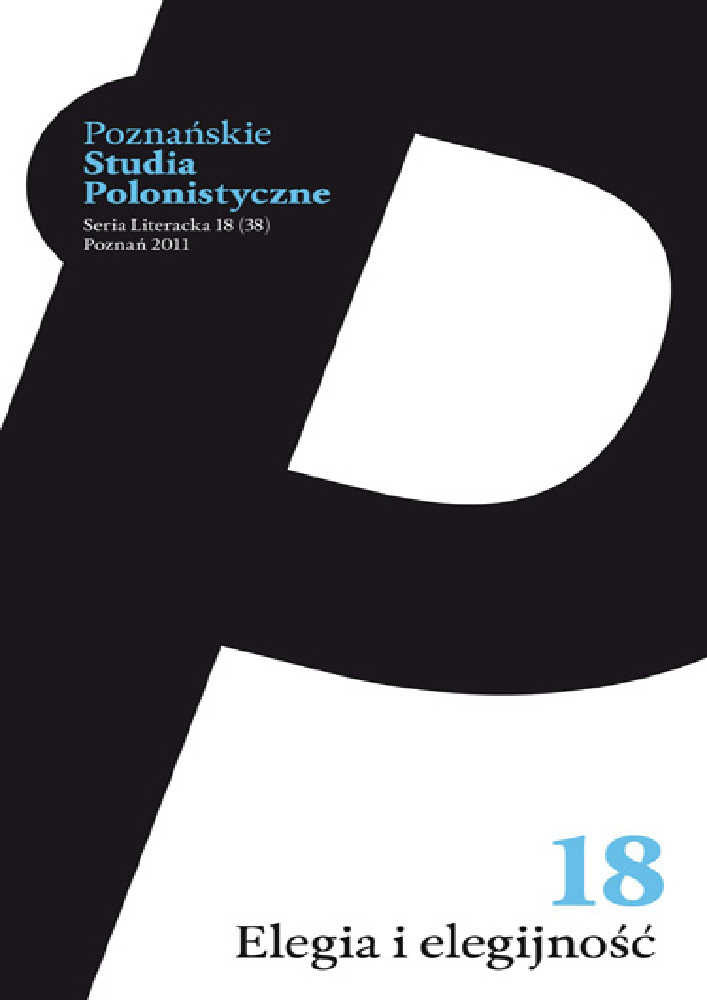Abstract
The present article tries to show and characterize Aleksander Wat’s poetic diction included in the pool of the kinds of the literary elegiac mood and mournful strains used by the writer. Wat does not employ just one language that would offer the power of expressing oneself and convey one’s own existential experience — he speaks with varied elegiac voices: be it full of sadness, melancholy and despair, be it filled with irony and sarcasm. In fact, the elegiac tone in its traditional variation is to be found only in one war poem, whereas all his post-war poetic volumes bring a rich polyphony of varied elegiac voices. Wat’s late poetic writings is underlined by a necessity to renew what has already happened, to repeat the existing pattern of expressing oneself, and thus forms a particular elegiac intertextuality. In this way, such rhetorical dimension of the word is revealed that challenges the feasibility of getting the content through in a straightforward manner. The awareness of repetition, however, does not restrict the author to silence — just the opposite, it makes him aware of a necessity to draw from codes lodged in tradition and thus to create a collage-like diction of his own.
References
Barańczak S., Wat: cztery ściany bólu, w: Pamięć głosów. O twórczości Aleksandra Wata, red. W. Ligęza, Kraków 1992.
Boniecka E., Poezja a projekt egzystencji. W kręgu postaw i tożsamościowych dylematów
w twórczości Aleksandra Wata, Gdańsk 2008.
Borowski J., „Między bluźniercą a wyznawcą”. Doświadczenie sacrum w poezji Aleksandra Wata, Lublin 1998.
Brzozowski J., Notatki do „Wiersza ostatniego”, w: Szkice o poezji Aleksandra Wata, red. J. Brzozowski, K. Pietrych, Warszawa 1999.
Kołakowski L., Kapłan i błazen, w: Pochwała niekonsekwencji. Pisma rozproszone z lat 1955–1968, oprac. Z. Mentzel, t. 2, Londyn 1989.
Lanham R.A., The Motives of Eloquence. Literary Rhetoric in the Renaissance, New Haven 1976.
Legeżyńska A., Gest pożegnania. Szkice o poetyckiej świadomości elegijno-ironicznej, Poznań 1999.
Ligęza W., Jaśniejsze strony katastrofy. Szkice o twórczości poetów emigracyjnych, Kraków 2001.
Pietrych K., O „Wierszach śródziemnomorskich” Aleksandra Wata, Warszawa 1999.
Rutkowski K., Nota redakcyjna, w: A. Wat, Dziennik bez samogłosek, oprac. K. i P. Pietrychowie, Warszawa 2001.
Rojek P., „Historia zmącona autobiografią”. Zagadnienie tożsamości narracyjnej w odniesieniu do powojennej liryki Aleksandra Wata, Kraków 2009.
Rusinek M., Między retoryką a retorycznością, Kraków 2003.
Sobolewska A., „Poczekalnia sądu ostatecznego”. Sen w poezji Aleksandra Wata, w: Szkice o poezji Aleksandra Wata, red. J. Brzozowski, K. Pietrych, Warszawa 1999, s. 185–200.
Święch J., Literatura polska w latach II wojny światowej, Warszawa 1999.
Venclova T., Aleksander Wat. Obrazoburca, przeł. J. Gorlicki, Kraków 1997.
Wat A., Poezje, oprac. A. Micińska, J. Zieliński, Warszawa 1997.
Wat A., Poezje zebrane, oprac. A. Micińska, J. Zieliński, Kraków 1992.
Wat A., Publicystyka, oprac. P. Pietrych, Warszawa 2008.Ziomek J., Retoryka opisowa, Wrocław 2000.
License
Authors
Authors of texts accepted for publication in „Poznańskie Studia Polonistyczne. Seria Literacka” are required to complete, sign and return to the editor's office the Agreement for granting a royalty-free license to works with a commitment to grant a CC sub-license.
Under the agreement, the authors of texts published in „Poznańskie Studia Polonistyczne. Seria Literacka” grant the Adam Mickiewicz University in Poznań a non-exclusive, royalty-free license and authorize the use of Attribution-NoDerivatives 4.0 International (CC BY-ND 4.0)Creative Commons sub-license.
The authors retain the right to continue the free disposal of the work.
Users
Interested Internet users are entitled to use works published in „Poznańskie Studia Polonistyczne. Seria Literacka” since 2016, for non-commercial purposes only, under the following conditions:
- attribution - obligation to provide, together with the distributed work, information about the authorship, title, source (link to the original work, DOI) and the license itself.
- no derivatives - the work must be preserved in its original form, without the author's consent it is not possible to distribute the modified work, such as translations, publications, etc.
Copyrights are reserved for all texts published before 2016.
Miscellaneous
Adam Mickiewicz University in Poznań retains the right to magazines as a whole (layout, graphic form, title, cover design, logo etc.).
